
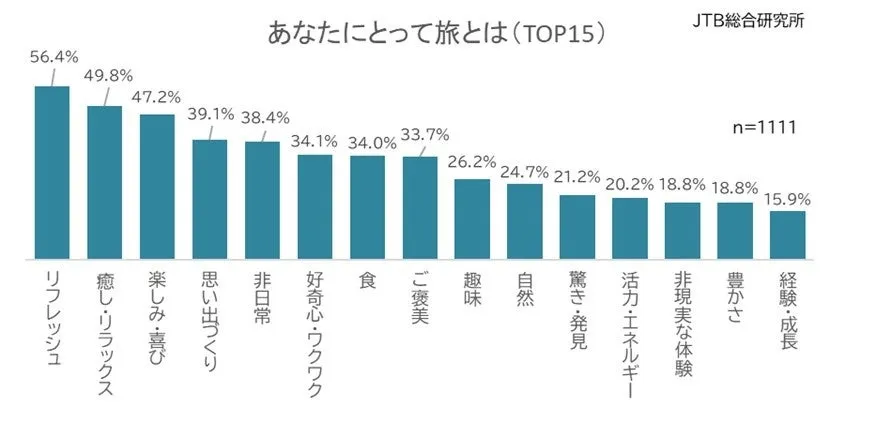
Exploring the Meaning of 'Extraordinariness' in Travel Experiences
Introduction to Travel Satisfaction
Travel has long been associated with concepts of relaxation, refreshment, and joy. A recent study conducted by JTB Research Institute in Tokyo delves into what travelers seek in their adventures, focusing on the element of 'extraordinariness' in their experiences.
How Travelers Define Their Journey
When asked about the meaning of travel, many respondents emphasized themes of refreshment (56.4%), relaxation (49.8%), joy (47.2%), creating memories (39.1%), and the pursuit of 'extraordinariness' (38.4%). Interestingly, around 80% of people reported having moments of 'extraordinariness' during their travels. This can be described as a break from the usual grind of work and home responsibilities, as well as new experiences, especially for children exploring the world for the first time.
The Unique Experiences of Travel
The concept of 'extraordinariness' hasn't remained static. Participants shared insights through both surveys and personal interviews, revealing that 'extraordinariness' can emerge from everyday activities—such as enjoying a city's skyline, sipping coffee, or interacting with locals when traveling abroad. Many feel a distinct sense of novelty when they interact with foreign travelers, reflecting the enhanced diversity in travel experiences today.
Shifts in Travel Preferences Among Younger Generations
An emerging trend noted in the research is that younger generations increasingly prioritize activities over destinations. When respondents were asked about how they choose their travel spots, a significant portion of younger travelers indicated they often decide based on enticing social media images of local cuisine or beautiful landscapes, rather than determining a destination first and then planning activities. This shift underscores a move towards a more experience-driven approach to travel.
The Post-COVID Travel Landscape
The COVID-19 pandemic has had a profound impact on travel habits and preferences. Notably, 26.8% of respondents indicated they avoid traveling during peak times to evade crowds. Other observations revealed that people are more selective now, with some losing interest in overseas travel, particularly older age groups. In contrast, younger travelers reported a more adventurous spirit, preferring to explore alternative sources of travel information beyond the internet, suggesting a nuanced evolution in how trips are planned.
Embracing the Unique and Unfamiliar
As per the study’s findings, the quest for 'extraordinariness' isn't limited to traveling far; even commonplace experiences become unique and intriguing when infused with travel. Elements like local cafes, historic sites, or bustling transit stations gain a new allure when experienced in a different context. This desire for 'extraordinariness' has driven many to seek out unique locales often celebrated in travel stories or social media.
The Shift Towards Experience-Centric Travel
The study indicates a shift towards using visual content as a way to gather travel information. Video searches and map applications are becoming vital tools for planning trips. This transformation highlights a desire among younger individuals not only to see beautiful destinations but also to engage with the environment and culture actively. Consequently, images and videos that capture appetizing food, vibrant local scenes, or unique experiences take precedence over simple travel narratives.
Conclusions on Travel Transformation
In summary, this exploration into what travelers currently seek reveals a complex tapestry of needs spanning refreshment, connection, and discovery of the extraordinary. As attitudes towards travel continue to evolve, there’s a collective inclination to embrace experiences that offer both comfort and excitement, allowing travelers to escape the ordinary and immerse themselves in the richness of diverse landscapes and cultures. The findings suggest a hopeful future for the travel industry, where the focus is not merely on the destination, but on the unique experiences that enrich the journey itself.
Survey Overview
The research was conducted using a web-based survey among 10,982 adults in Japan, from which 1,111 respondents had traveled in the last year. 28 of them participated in detailed chat-format interviews. The survey was carried out from March 18 to 22, 2025.
For inquiries
Please contact JTB Research Institute Corporate Planning Department's Public Relations via their contact form.
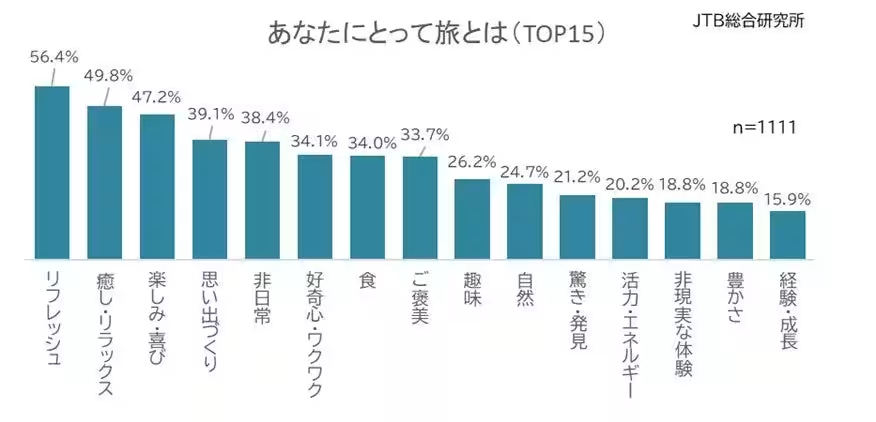
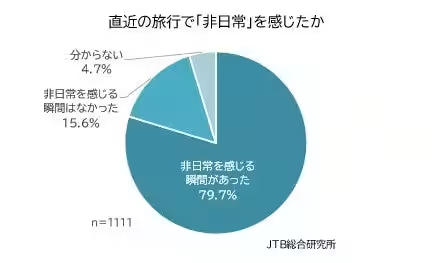
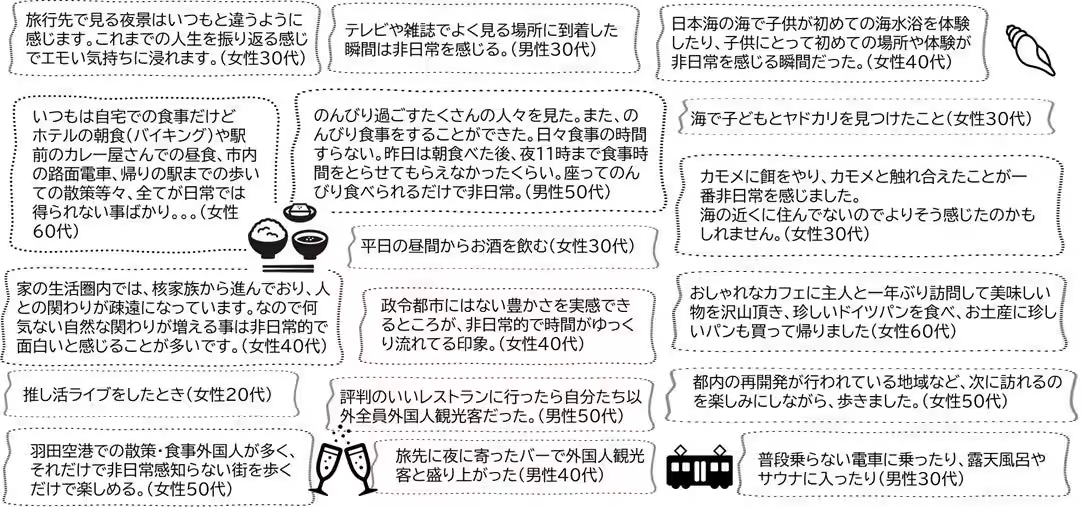
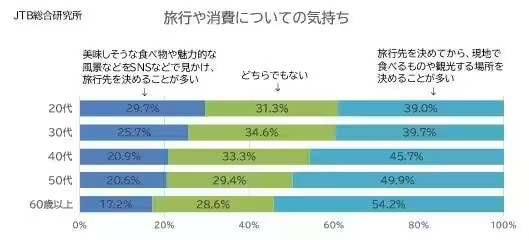
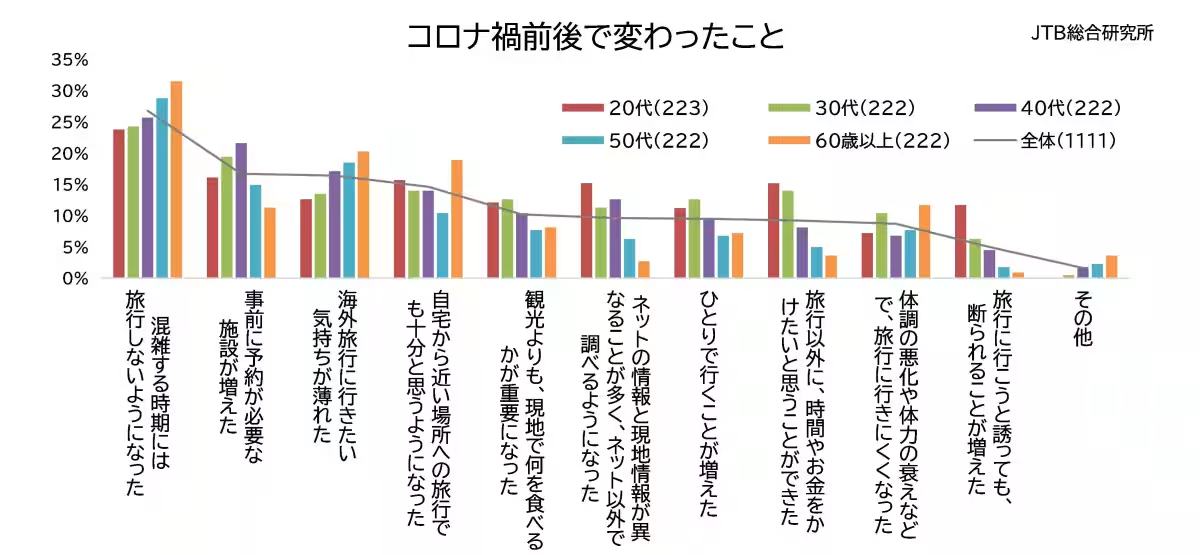
Topics Travel)










【About Using Articles】
You can freely use the title and article content by linking to the page where the article is posted.
※ Images cannot be used.
【About Links】
Links are free to use.